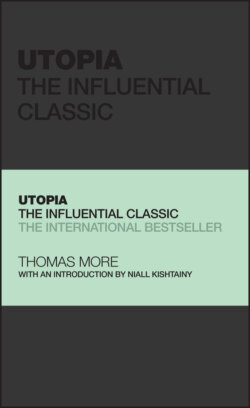Utopia

Реклама. ООО «ЛитРес», ИНН: 7719571260.
Оглавление
Sir Thomas More. Utopia
Table of Contents
Guide
Pages
UTOPIA. The Influential Classic
With an Introduction by. NIALL KISHTAINY
AN INTRODUCTION
THE WRITING OF UTOPIA
THE ISLAND OF UTOPIA
UTOPIA AND THE REAL WORLD
MORE'S CAREER DILEMMA
A UTOPIAN IN TUDOR ENGLAND
MORE'S INTENTION IN UTOPIA
INTERPRETING UTOPIA
UNCOVERING MORE THE MAN
THE LEGACY OF UTOPIA
A Note on the Translation
REFERENCES
ABOUT NIALL KISHTAINY
I. LETTER: THOMAS MORE TO PETER GILES
II. LETTER: PETER GILES TO JEROME DE BUSLEYDEN
III. LETTER: THOMAS MORE TO PETER GILES
IV “UTOPIA” METER
VERSES
NOTE
V. BOOK ONE
VI. BOOK TWO
OF THEIR TOWNS, PARTICULARLY AMAUROT
OF THEIR MAGISTRATES
OF THEIR TRADES, AND MANNER OF LIFE
OF THEIR SOCIAL RELATIONS
OF THE TRAVEL OF THE UTOPIANS
OF THEIR WEALTH
OF THEIR LEARNING AND PHILOSOPHIES
OF THEIR LEARNING
OF THEIR SLAVES
OF THEIR DEATHS
OF THEIR MARRIAGES
OF THEIR LAWS AND PUNISHMENTS
OF THEIR FOREIGN POLICIES
OF THEIR MILITARY DISCIPLINE
OF THE RELIGIONS OF THE UTOPIANS
OF THEIR COMMONWEALTH
WILEY END USER LICENSE AGREEMENT
Отрывок из книги
Also available in the same series:
Map of Utopia by Abraham Ortelius (1527-1598) circa 1595
.....
The subtitle of More's opus – A Truly Golden Little Book, No Less Beneficial than Entertaining – raises the central critical problem of Utopia that its readers have been arguing about ever since: what did More intend? Is the book meant as a piece of literary entertainment or as social instruction? If we are meant to take its social arguments seriously, then which of the opposing characters' views are we meant to believe? Is the real More instructing us about how to take our own societies closer to perfection, or is he saying that this is a futile endeavour? Who speaks for the real More: the fictional More and Giles, the sceptics, or Raphael, the arch‐radical?
This sense of ambiguity runs through the text, which is full of word play and paradox, starting with the word utopia itself. It is a Greek‐derived neologism of More's that could mean ‘good place’ (eu‐topia) or ‘no place’ (ou‐topia). The river that flows through Amaurot is called Anyder or ‘waterless’ and the governor of Utopia is named Ademus, ‘without a people’. Even the shape and dimensions of the island described by Raphael turn out to be mathematically impossible. Raphael Hythloday bears as his first name that of the archangel who came to heal, yet the second part of his name means ‘peddler of nonsense’. Finally, More was fond of punning the Latin version of his name, Morus, the Greek for ‘fool’. It raises the question: if Raphael peddles nonsense, then why does the fictional More oppose him with the objections of a halfwit?
.....